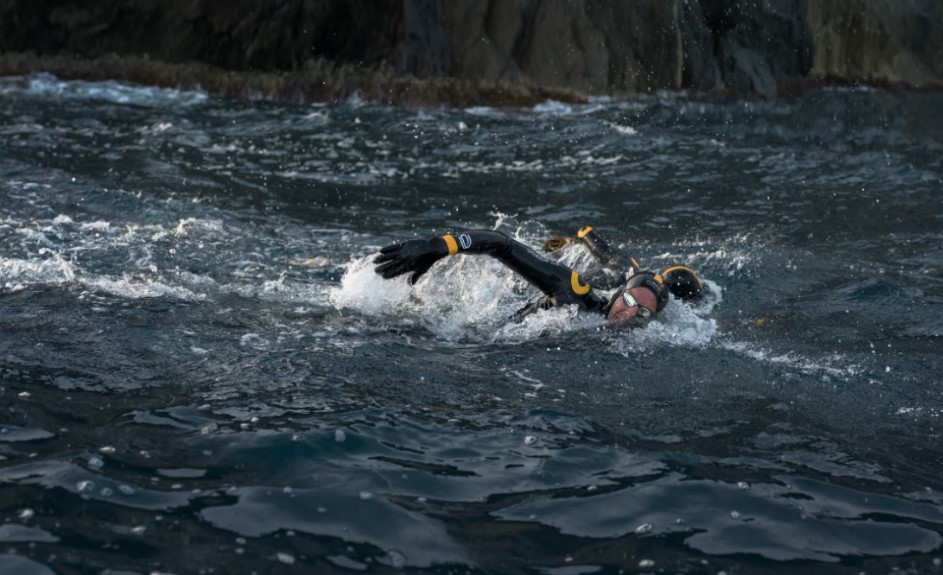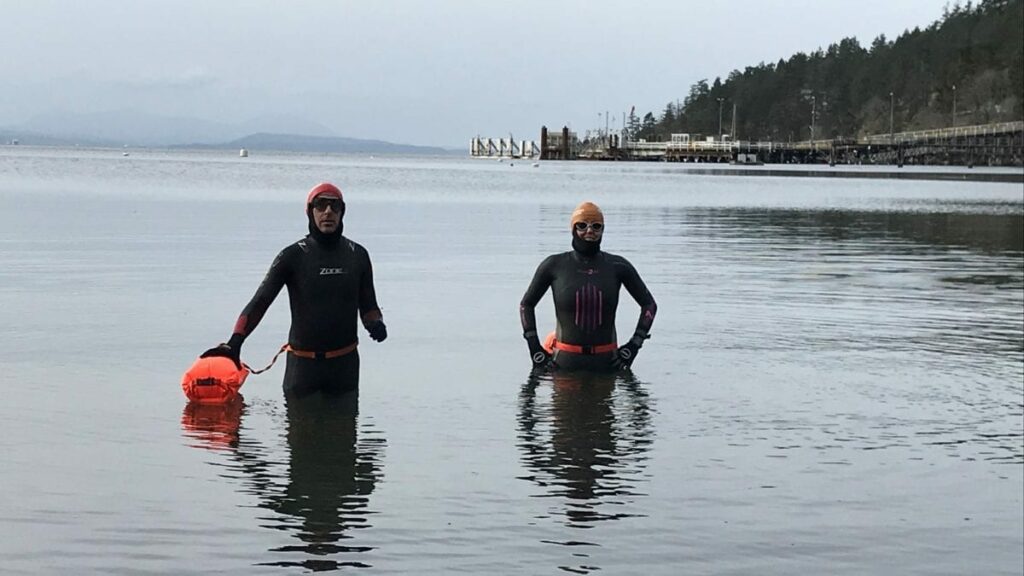Should you brave cold water swimming in the winter to be a better triathlete?
Swimming in cold water is more popular than ever – but is it for you?
 Photo by:
Courtesy Deboer
Photo by:
Courtesy Deboer
Back in the dark days of the lockdowns when all the pools were closed, we were treated to many an online video of swimmers finding interesting and innovative ways to stay fit. There was a run on swim bands for dryland workouts, Olympic athletes were tethering themselves to fenceposts just to get in a swim and athletes of all levels were heading to the open water in previously unseen numbers. But, as lockdowns dragged on and the weather turned colder, something odd happened. Many athletes stayed swimming in that open water – well after the time of year when they would have normally hung up their wetsuits. A group of athletes at the club where I coach actually swam outside in Lake Ontario throughout the winter, getting in at least one swim each month – even when the surface temperate of the lake was down to only 1 degree Celsius. They were willing to go to extreme measures to scratch their swimming itch. Amazingly, despite the return of regular pool access, this habit has not gone away. It has now become a part of swimming life for a small, but committed, group of athletes in our club.
What is driving this desire to dip into cold water and should you make it a part of your swimming life as well?
Apart from experiencing year-round joy from being in the open water, there are many purported benefits to cold water immersion. We have likely all seen or heard of elite athletes sitting in ice baths post-workout, and many athletes swear that it helps reduce muscle soreness and enhances recovery. A series of recent meta-analysis also seem to provide some support for this assertion. But sitting in a tub of ice water after exercise is not the same thing as going for a swim in cold water. So why do people do it?

In addition to the aforementioned joy that many people get from being out in the open water and accelerated recovery, there is a belief by many – yet to be conclusively supported by scientific evidence – that immersion in cold water has health benefits, ranging from lower cardiovascular disease risk to better mental alertness and reduce insulin insensitivity. But, before you jump on the cold-water bandwagon, there are a few things that you should keep in mind.
First off, it is not cheap. If you want to swim in really cold water – and by this I mean water colder than 10 C – your normal triathlon wetsuit, even with booties and a neoprene cap, is not going to cut it. You will need to purchase a specialized cold-water suit, a full neoprene hood with an apron that extends under your wetsuit, thicker neoprene booties and thick neoprene gloves.
Secondly, swimming in this kind of gear and at these kinds of temperatures is not about getting a workout. Forget pace times, goal distances and target heart rates. This is about being in the water, getting a little “splash about” and having an experience. Yes, you can get in some yardage, but it will not be the equivalent to what you can get in a pool.
Ironman world champion’s cold-water training choice: Deboer introduces the Ocean 1.0
Thirdly, this type of activity is not without risk. Sudden cold-water immersion carries a risk for those with heart conditions. It can also be challenging for those with circulatory issues. In addition, hypothermia is a real risk, including a phenomenon know as “afterdrop” where you may feel fine until you get out of the water, but then your core body temperature rapidly drops as blood circulates through your frigid extremities and then back to your core. For all of these reasons, you should NEVER swim in cold water alone and, ideally, should find other people in your local area with experience in your local waterways to guide you into cold-water swimming. For more tips on cold water safety check out this site.
If, despite these caveats, you decide that cold-water swimming is something you do want to do, know that you will be joining a small community of people dedicated to experiencing the joy of the open water year-round – and maybe getting some health benefits too!
References:
- Moore E, Fuller JT, Buckley JD, Saunders S, Halson SL, Broatch JR, Bellenger CR. Impact of Cold-Water Immersion Compared with Passive Recovery Following a Single Bout of Strenuous Exercise on Athletic Performance in Physically Active Participants: A Systematic Review with Meta-analysis and Meta-regression. Sports Med. 2022 Jul;52(7):1667-1688. doi: 10.1007/s40279-022-01644-9. Epub 2022 Feb 14. PMID: 35157264; PMCID: PMC9213381.
- Xiao Feiyan, Kabachkova Anastasiia V., Jiao Lu, Zhao Huan, Kapilevich Leonid V. Effects of cold water immersion after exercise on fatigue recovery and exercise performance–meta analysis. Frontiers in Physiology. 14 2023. doi:0.3389/fphys.2023.1006512
- Esperland D, de Weerd L, Mercer JB. Health effects of voluntary exposure to cold water – a continuing subject of debate. Int J Circumpolar Health. 2022 Dec;81(1):2111789. doi: 10.1080/22423982.2022.2111789. PMID: 36137565; PMCID: PMC9518606.
- https://www.outdoorswimmingsociety.com/category/survive/cold/
Darian Silk is a triathlon coach and Clinical Exercise Physiologist based in Toronto. Read more about Darian here or email him at darian@teamatomica.com. You can also check out his TrainingPeaks profile here.
